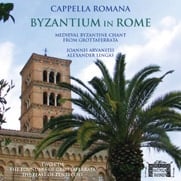 NEW Double CD
NEW Double CD
BYZANTIUM IN ROME: Medieval Byzantine Chant from Grottaferrata
Sound samples: Teleutaion Alleluia | Prosomoia for St. Benedict | Kontakion for St. Bartholomew | Communion for Pentecost
This release by Cappella Romana is a breathtaking collection of Medieval Byzantine Chant sung from manuscripts made at the Abbey of Grottaferrata in the suburban hills of Rome, which has operated continuously in the Byzantine rite since its founding before the Great Schism in 1004. During the Middle Ages, Grottaferrata was the site of an important scriptorium, the surviving manuscripts of which bear precious witness to musical repertories sung in Constantinople before the Crusader sack of 1204.
Led by virtuoso cantor Ioannis Arvanitis, Cappella Romana recaptures on this recording the artistic vibrancy of medieval Italy’s Greek minority with ecstatic 13th-century chants. Disc one is devoted to the life and work of the monastery’s founders St. Neilos and St. Bartholomew, including kontakia in their honor, and an excerpt of a kanon for St. Benedict that was very likely composed for a Greek-rite all-night vigil at the Benedictine community at Montecassino in Sicily. Disc two features music for Pentecost, beginning with excerpts of its two kanons, the alleluiarion, and the communion verse for the feast. The central work on disc two is the Teleutaion (Final Antiphon) of the kneeling vespers in the medieval cathedral rite, featuring extended psalmody and ecstatic settings of the angelic refrain “Alleluia,” foreshadowing the beautified (“kalophonic”) chant of St. John Koukouzeles.
The booklet features a substantial essay on the music and its context by musicologist and Cappella Romana artistic director Dr. Alexander Lingas, and complete original texts in Greek with English translations by Archimandrite Ephrem (Lash). Beautiful photography of the Byzantine Abbey of Grottaferrata, taken on Cappella Romana’s tour there in May 2006, illustrates the booklet, as well as a sample of medieval Byzantine notation (as opposed to contemporary notation in the received tradition) drawn from the opening verse of the Teleutaion in the Grottaferrata manuscript Psaltikon Ashburnamensis 64. The CDs combined feature over 82 minutes of music.
Two CDs (CD1: The Founders of Grottaferrata; CD2: The Feast of Pentecost).

You must be logged in to post a comment.